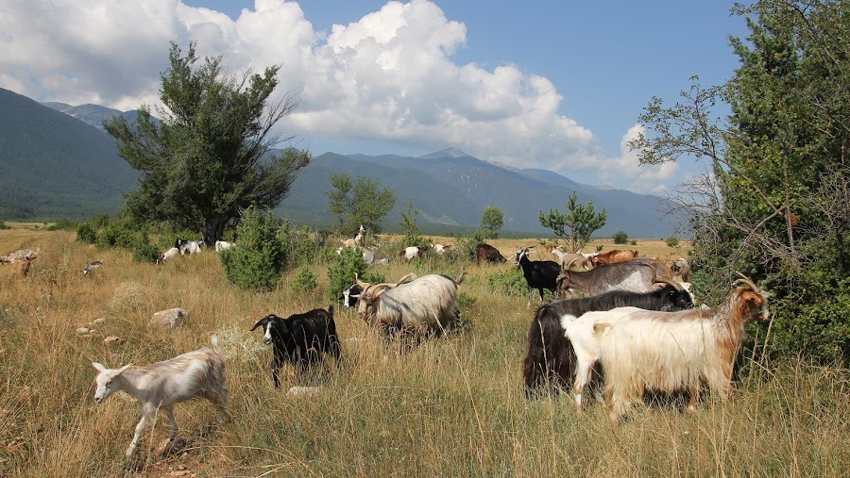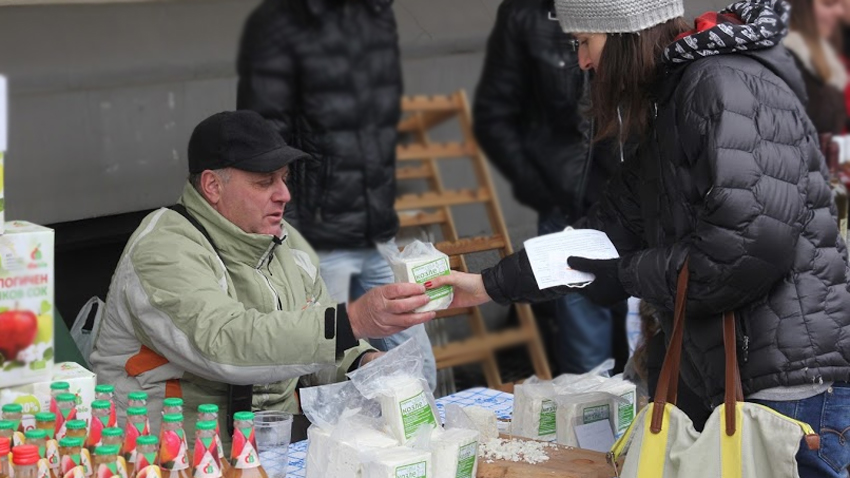The Mutafchiev family has been producing authentic Bulgarian goat’s cheese since 2009. They make only white brine goat’s cheese, rather than crottin de chevre (small round molded cheese made from goat’s milk) of the Corsican semi-dry goat cheese. Mrs. Mitafchieva is a skilled technologist and she could easily make that cheese type as well. However, her family tries to adhere as much as possible to the authentic Bulgarian taste. That is why the Mutafchievs joined the international Slow Food movement. The latest visit of Slow Food’s founder Carlo Petrini to Sofia and their participation in European Slow Food exhibitions (the last one AFD Gast in Vienna, Austria) provoked our strong interest towards these cheese manufacturers.
The Mutafchiev family has been breeding for years the long-fur mountain goat. They produce unique cheese from its pure and clean milk. Mr. Mutafchiev told Radio Bulgaria why his family prefers that type of goat breed:

“This goat breed is more tenacious - the winter conditions in Bulgaria are harsh and this animal is used to living in these conditions. It is an old breed which has a low milk yield. However, its milk quality is perfect.”
The taste of that goat’s cheese is exceptional. The level of maturity of the cheese predetermines its saltiness and texture. It is a matter of family traditions and theoretical knowledge and skills. Mr. Mutafchiev has more about goat breeding and cheese production:
“When I was a little boy my grandfather used to take me very often with him to the mountains. Back then people used to make that cheese in wooden casks. The cheese was not mature, but it was delicious. Then I started to dream of making something bigger when I grow up and make my product popular amidst larger groups of people. ”

When we say goat’s cheese, we usually associate it with some of the world’s most famous cheese brands. However, the Mutafchievs are not interested in making those types of cheese. On one hand, the Bulgarian climate makes their manufacture harder. On the other hand, the Bulgarian producers do not want to penetrate a market with strong traditions and severe competition. Since it is a matter of taste, the Mutafchiev family believes that children must be taught to tell the difference between the cheese products they usually consume.
“We can and we should teach our children to know the food products well. We are extremely happy with the little children who sometimes surprise their mothers who say that their kids do not like cheese, but it turns out that they like goats’ cheese a lot.”

The little children are not the only ones who make the Mutafchievs optimistic after their short three-year experience with the small goat farm. In their view, the number of Bulgarians who know how real food should taste has been on the rise. The Slow Food Movement also contributed a lot to that culture, where people from all parts of Europe share similar ideas. There is an Italian proverb reading Chi va piano, va sano e va lontano (He who goes softly, goes safely, goes far). The members of that movement who are fans of real food share that view. Goat’s milk is much healthier than other types of milk. It is quickly absorbed by the human body - in only 20 minutes, whereas sheep and cow milk are absorbed in more than an hour. “That is why people say that goat’s milk is closest to human milk”, Mr. Mutafchiev concluded. We can only feel sorry that the digital technologies and the 3D printers do not allow us to send you that product, so you can have a good appetizer for a naturally fermented Bulgarian beverage.
English version: Kostadin Atanasov
Peaceful protests were held in Serbia against the detention of demonstrators Students and citizens staged a peaceful protest in front of the court building and the prosecutor’s office in Novi Sad, calling for the release of all arrested..
According to statistics from the Executive Forest Agency, between 2010 and 2024, there were 7,115 forest fires in Bulgaria , affecting 92,694 hectares of land. Data for the current year is not yet available. Over 90% of all fires are caused by human..
“Learn with an open mind; Serve a great cause” - this is the motto that guides the Beijing Foreign Studies University in the Chinese capital. The higher education institution, founded in 1941, today teaches 101 foreign languages,..
According to statistics from the Executive Forest Agency, between 2010 and 2024, there were 7,115 forest fires in Bulgaria , affecting 92,694 hectares..
Peaceful protests were held in Serbia against the detention of demonstrators Students and citizens staged a peaceful protest in front of the..

+359 2 9336 661
